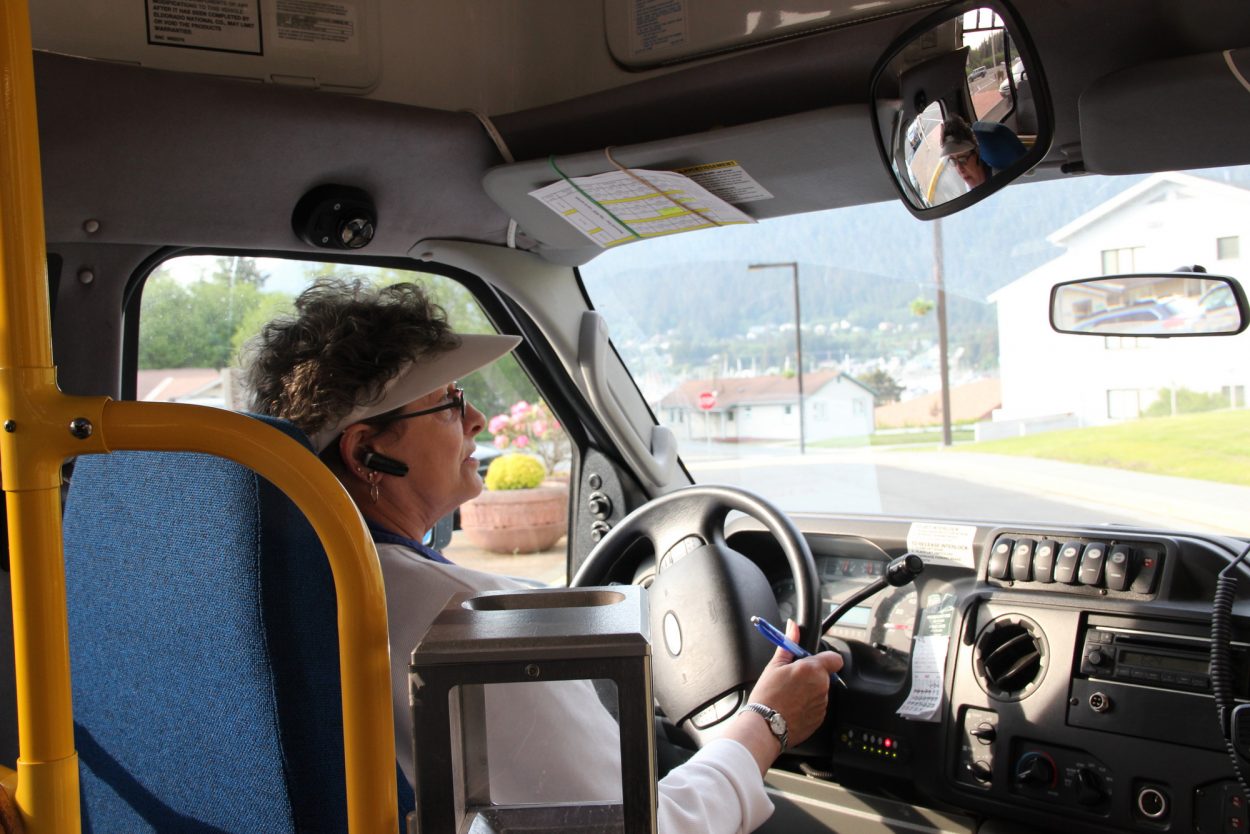
Unless the city steps in, The Ride may have to cut hours or even a full bus line, the Assembly was told. (KCAW photo/Rachel Waldholz)
Sitka’s bus system, The Ride, is facing a major shortfall.
Representatives of The Ride told the Sitka Assembly last night (Tuesday 3-10-15) that without city support, the system will likely have to cut hours — or even a full bus line.
The Ride is run as a partnership between the Center for Community, the Sitka Tribe of Alaska (STA) and Southeast Senior Services, and funded by a combination of state and federal grants. Historically, the city has played no part in funding the bus system, although last year, the Assembly agreed to a one-time grant of $25,000.
This year, The Ride is requesting $100,000.
Connie Sipe, of the Center for Community, told the Assembly The Ride is a good investment.
“We know money is tight,” she said. “But we also know that transit – through the three partner agencies, Center for Community, Sitka Tribe, and Southeast Senior Services — brings nearly a million dollars a year, every year, year after year, into this community. It’s spent here on mechanics’ fees, salaries, wages, benefits, and gas. It’s all spent here.”
The shortfall comes as a result of policy changes in Washington, D.C.
Since 2007, STA has received federal grants to fund the Green Line, which runs back and forth from downtown to Japonski Island, with stops at SEARHC and the University of Alaska, Southeast.
In previous years, STA received an average of $240,000 to run that line. This year, that amount was cut to $150,000. In the next two years, it will drop still more, bottoming out at $80,000.
That’s because Congress has changed the funding formula for tribal transit grants. STA Transportation Director Gerry Hope said those changes mean many Alaska tribes are ending up with less money.
In 2014, The Ride provided an average of 230 rides a day. Hope said if the city wants to see that kind of service continue, it will have to step up — and that it’s hard to ask for more money from federal agencies when the city isn’t pitching in.
When funders have come on site visits, Hope said, “In both cases, they asked, ‘What is the city’s role in public transit?’ And we had to say, for fixed route, there’s no role, there’s absolutely no buy-in. And their jaws dropped to the floor. It’s unheard of for the city government to have no role at all in public transit.”
“Somehow we’ve stood apart,” Hope said. “And the burden has been on a nonprofit and the tribal government to provide this service.”
Assembly member Ben Miyasato, who had requested the discussion, recused himself because he sits on the Sitka Tribal Council and is chair of the Tribe’s transportation subcommittee. He spoke from the audience in favor of the funding. Mayor Mim McConnell and Assembly Members Michelle Putz and Tristan Guevin also expressed support.
But Deputy Mayor Matt Hunter said that in a tough budget year, he wasn’t sure the city could afford it.
“We have the Sitka School District, which is facing a much larger gap, in excess of $2-million, likely,” Hunter said. “They’re going to be looking at staff reductions. And I’m having some real difficulty looking at essentially expanding the scope of what the city supports, in terms of services, when we are looking at having to pull back on services we currently operate due to our budget.”
In the end, the Assembly voted 4 – 2 to include a $25,000 placeholder for The Ride in the 2016 budget. Hunter and Assembly Member Steven Eisenbeisz voted against that placeholder.
The exact amount will be subject to revision once the Assembly takes up the full budget, next month.































